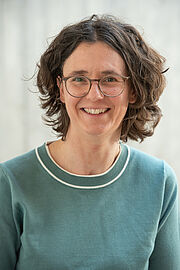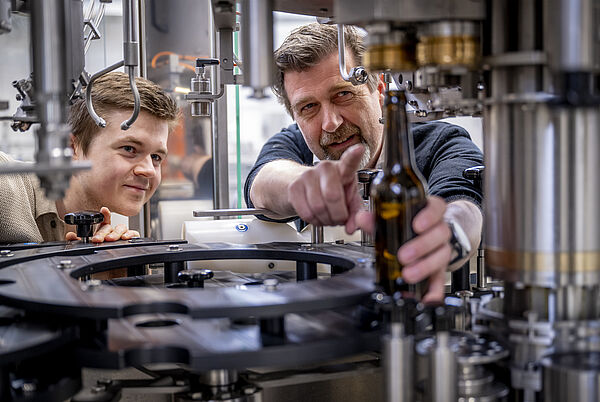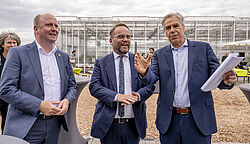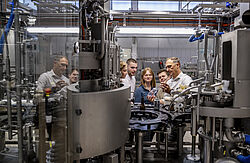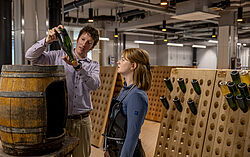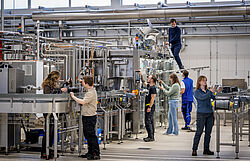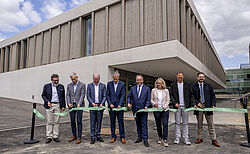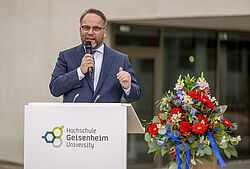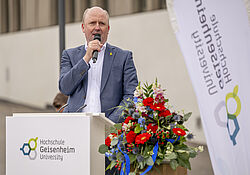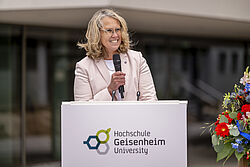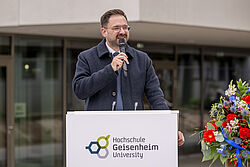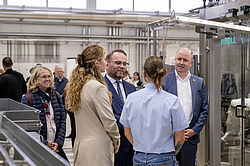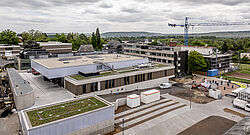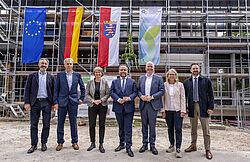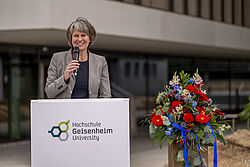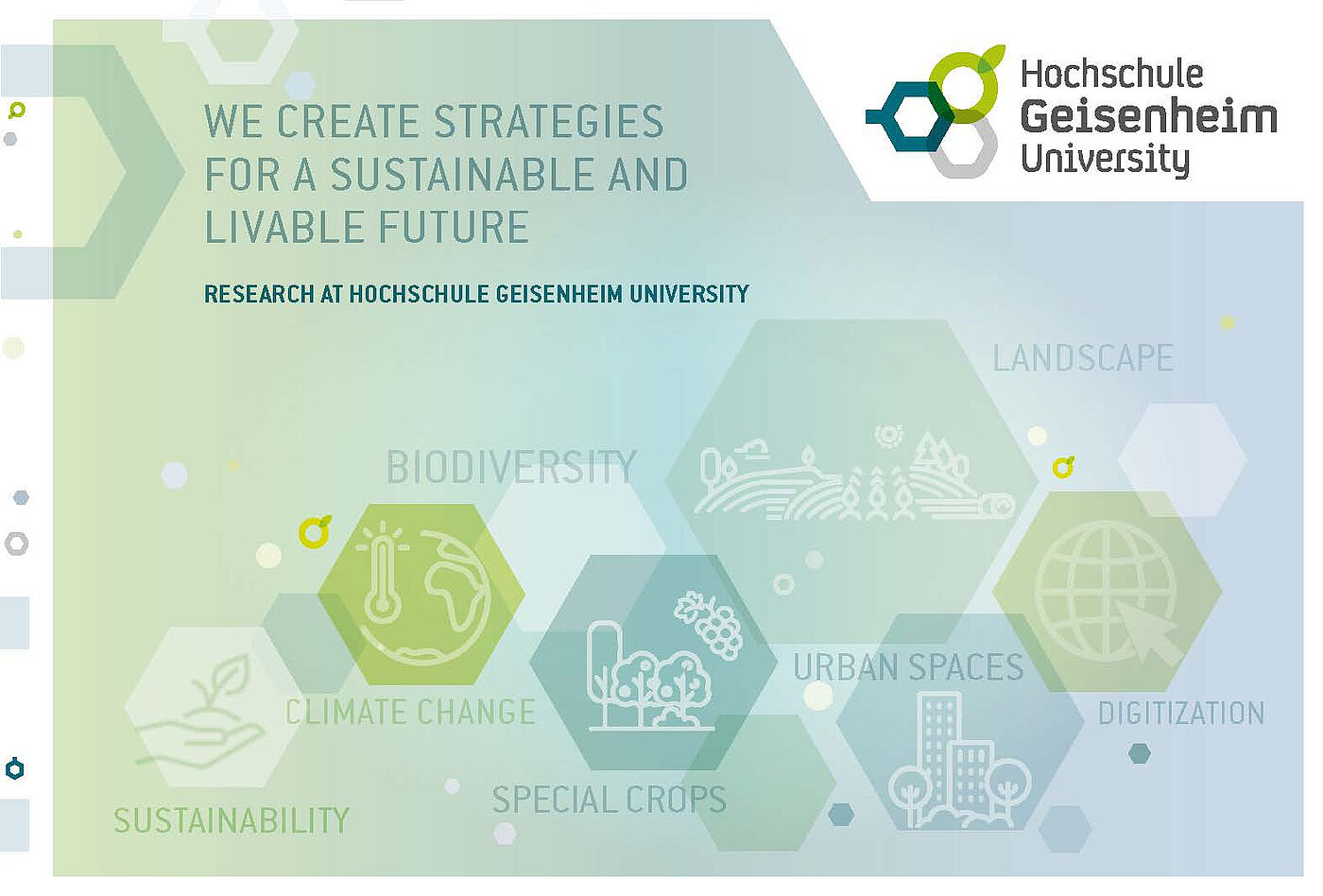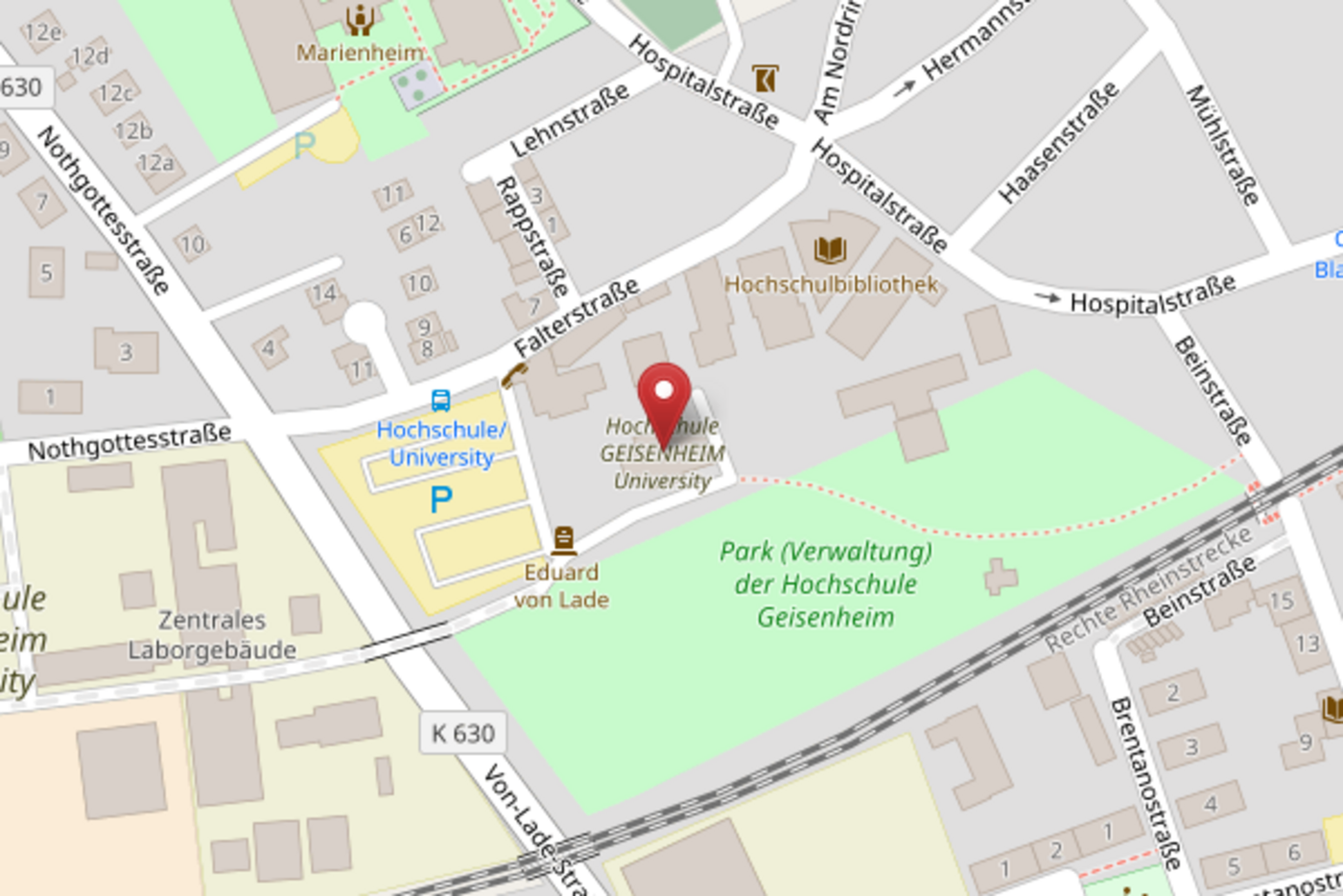Today, Hochschule Geisenheim University celebrated two significant milestones in the ongoing development of its campus. Guests and partners from the world of business and politics were invited to the campus to celebrate the official opening of the new Beverage Technology Center and a topping out ceremony for the new VITA building, marking the completion of its outer construction.
The new Beverage Technology Center (GTZ) is an important component in teaching and research in the field of beverages and wine at Hochschule Geisenheim University. The new building will replace the existing beverage technology center and offer completely new opportunities in terms of student education and vocational training, with a focus on practical application. The VITA building, a research center for sustainable and climate-oriented viticulture, will provide a space for investigating how climate change affects the metabolism of plants, interactions between grapevines and associated organisms, ecosystem functions, and water and nutrient flux in vineyards.
The construction costs of the GTZ amount to around €35 million, which have been financed through Hesse’s HEUREKA investment program for the expansion of higher education institutions. A budget of around €35 million is also planned for the construction of the VITA building, of which €16.3 million will be provided by the federal government and the remainder by the state of Hesse. The building is planned to open at the end of 2026.
Politicians and Partners in Attendance at the Ceremony
Guests and partners from the local authorities and the world of politics were invited to the GTZ’s inauguration and the topping out ceremony for the VITA Building, including Timon Gremmels, Hesse’s Minister of Science and Research, Arts and Culture; Uwe Becker, State Secretary in Hesse’s Ministry of Finance; Petra Zellner, representative of Director of Landesbetrieb Bau und Immobilien Hessen (LBIH); and Christian Aßmann, Mayor of Geisenheim.
After the end of the inauguration and topping out ceremony, Michael Ludwig, Professor Bernd Lindemann, and Professor Ralf Schweiggert offered guests a tour of the GTZ, complete with fascinating insights into the new possibilities the building provides. The event concluded with a chance for conversations over drinks and snacks, accompanied by music provided by the Geisenheim bank Sheep Emely. Professor Annette Reineke, Vice President of Research at the University of Geisenheim, was responsible for moderating the ceremony.
Comments
“We need to find innovative solutions for creating sustainable and climate-adapted viticulture. The new VITA research center will provide excellent opportunities for this development, and its construction underlines the university’s commitment to excellence in research and education,” says Timon Gremmels, Hesse’s Minister of Science. “In the future, the university’s practice-oriented training in the field of beverage technology will take place in the new Beverage Technology Center. The building will play a major role not only for the Beverage Technology degree program, but also for teaching in the areas of viticulture, enology, and wine business. The state of Hesse is a strong partner in this development and has financed the total construction costs, amounting to around €35 million, from HEUREKA funds.”
“Hochschule Geisenheim University is closely linked to the region and has an excellent reputation beyond the boundaries of the state of Hesse. This is a place where research and praxis go hand in hand,” says Uwe Becker, State Secretary at Hesse’s Finance Ministry. “The Beverage Technology Center is now a finished building that will consciously shape the architectural image of the university and invite curiosity about the production taking place inside. Whether it’s producing fruit juice and Sekt or processing tea and coffee, the practical aspects of beverage technology can be taught and learned at the new center. In the new VITA research center, research will be conducted into the effects of climate change on viticulture and potential future solutions at the highest level. Both projects demonstrate the broad spectrum of the university and are key components in the development of the campus, which the state of Hesse is funding with a total of over €100 million from the HEUREKA program.”
“With the new buildings, we are creating a modern space for the consistent development of Hochschule Geisenheim University and its tight connection to praxis. The new Beverage Technology Center enables us to support the education of a new generation of workers with state-of-the-art facilities, helping them to prepare to transform the beverage and wine industry,” says Professor Hans Reiner Schultz, President of the university. “The VITA building opens the door to future-oriented research: it will provide a setting in which the impact of climate change on viticulture can be recorded even more precisely than before, helping us to develop appropriate adaptation strategies. We are working on scaling up these strategies in close cooperation with companies and through the use of our open-air areas, greenhouse areas, and established field testing areas, and thus on developing pioneering solutions for viticultural practice.”
Petra Zellner, who was at the event to represent the Director of the LBIH, commented: “The completed Beverage Technology Center and the VITA research building, which is still under construction, are significantly contributing to making the ultimate plan for the campus a reality. Their design will give the campus a distinctive architectural identity compared to other universities in Germany. At Geisenheim, historical buildings are mixed with new, thoughtfully designed buildings, all of which then harmonize with the unique landscape of the Rheingau region; we are delighted that the new buildings are now another thread in this overall tapestry. They will serve to strengthen the university’s research and teaching capacities and improve the infrastructure for students and researchers.”
Christian Aßmann, Mayor of Geisenheim, commented: “I am delighted that the extensive developments at Hochschule Geisenheim University are continuing and that new buildings can now be inaugurated once again. This is a significant contribution to strengthening local work, research, and teaching. The new, modern buildings offer the university's employees attractive workplaces and will certainly increase their satisfaction and loyalty to the university as an employer. Students will have access to a modern and sustainable infrastructure, which will further increase the attractiveness of Geisenheim as a university town.”
Professor Annette Reineke, Vice-President of Research: “Viticulture and the current form of land management are facing major challenges. As a university, we want to use our research to help identify solutions and paths for the future. The VITA building will provide us with a new research infrastructure that provides the very best conditions for developing sustainable cultivation systems that are adapted to climate change.”
Professor Mirjam Hey, Vice-President of Student & Academic Affairs: “Wine and beverages is our strongest study area, with almost half of our students in related programs. With our new buildings and our diverse range of degree programs, we are well positioned to support companies with the current challenges and transformation of the industry. We can offer our students, and those interested in studying, many new opportunities and excellent learning conditions.”
Professor Ralf Schweiggert, Head of the Department of Beverage Research: “The flexibility of the fully equipped technical center is outstanding. In addition to a selection of different traditional, modern, and innovative technologies, it is also now possible to conduct processing studies on an exploratory small scale (up to 10 kg) and on an industrial scale (200 kg to several tons), enabling us to transfer the work to industrial practice.”
Michael Ludwig, Department of Beverage Research: “The process engineering possibilities that are now available in the new Beverage Technology Center are unique in Germany and represent the next stage of development for Geisenheim as a training location and for further decades of practical teaching and research at the highest level.”
Dr. Matthias Schmitt, Department of Enology: “With the new Beverage Technology Center, we can centrally and reliably map the topic of ‘no-lo alcohol’ across the entire process chain under practical conditions and at different scales, right down to the bottle. This puts us in a position to survey and develop current and future trends in the wine and beverage industry in the area of non-alcoholic and low-alcoholic products.”
Dr. Bernd Lindemann, Professor of Beverage Technology: “The future of beverages lies in creativity. The new Beverage Technology Center offers us endless possibilities for experimentation, whether it's refreshing beer specialties - including non-alcoholic ones - or aromatic coffee variations. Our test breweries and coffee roasteries are places where tradition meets innovation. This building is where we reach new levels of teaching and innovative research.”


